Muslim Children and Memorization of the Holy Qur’an

Al-Hafiz Yunus Omotayo To the Muslim children, those modern psychologists who say that the ages from 9 to 21 years are the most fertile periods for memorizing things and during which the memory can effectively keep the information, have said nothing but the truth. For, this is what they could prove by way of their experience which they have been able to get through the act of memorizing the Holy Qur’an. While both the young and old ones from among the Christians, the Hindus, and the Zoroastrians etc. have been unsuccessful to learn the entire texts of their respective Scriptures by hearts, it is a matter of fact that many Muslim children right from the earliest periods of Islam have memorized the Qur’an with ease at an age as low as 9 years. Indeed there have been hundreds of thousands of such children memorizers of the Qur’an while the number keeps on increasing every day. In fact, as Hazrat Mirza Bashirudeen Mahmūd Ahmad (ra) noted in his Introduction to the Study of the Holy Qur’ān, it is only among Muslim communities you would find that even “children who were born blind or who lose their sight during infancy are encouraged to commit the Qur’an to memory. This is done out of a feeling that as a blind person is not competent to adopt a normal occupation he can turn his handicap to account by becoming a guardian of the text of the Qur’an.” I see it worthwhile to relate here the story of ‘Amr bin Salama (ra) and the wonderful situation through which he committed the Qur’an to memory. Amr bin Salam was a young boy who lived during the time of the Holy Prophet (saw) but whose case is that of a little child of 7 years who had memorized large potions from the Qur’an at a time when Islam had not even reached his village and there was no Muslim living there at all, he himself has not accepted the religion at that point in time. One would definitely be interested to know how then he was able to learn the Qur’an by heart. Below is how ‘Amr himself told the story. He relates thus: “We were at a place which was a thoroughfare for the people, and the caravans used to pass by us and we would ask them, “What is wrong with the people? Who is that man?” They would say, “That man claims that Allah has sent him (as a Messenger), that he has been inspired divinely, that Allah has revealed to him such-and-such.” I used to memorized that (Divine) Talk, and feel as if it was inculcated in my chest. The Arabs (other than Quraish) delayed their conversion to Islam till the Conquest (of Makka). They used to say, “leave him (i.e. Muhammad (saw) and his people Quraish: if he overpowers them then he is a true Prophet.” So, when Makkah was conquered, every tribe rushed to embrace Islam, and my father hurried to embrace Islam before (the other members of) my tribe. When my father returned from the Prophet (saw) to his tribe, he said, ‘By Allah, I have come to you from the Prophet (saw) for sure!” The Prophet (saw)afterward said to them, ‘Offer such and such Salat (prayer) at such and such time, and when the time for the Salat (prayer) becomes due, then one of you should pronounce the Adhan [for the Salat (prayer)], and let the one amongst you who knows Qur’an most, lead the Salat (prayer).” So they look for such a person and found none who knew more Qur’an than I because of the Qur’anic material which I used to learn from the caravans. They therefore made me their Imam to lead the Salat (prayer) and at that time I was a boy of six or seven years, wearing a Burda (i.e. a black square garment) proved to be very short for me and my body became partly naked. A lady from the tribe said, ‘Won’t you cover the buttocks of your reciter for us?” So they bought (a piece of cloth) and made a shirt for me. I had never been so happy with anything before as I was with that shirt.” Truly, if the act of committing the entire Qur’an to memory is one of those distinctive glories of Muslims that make them and their Holy Scripture to be so unique among all other peoples and scriptures, then those among Muslim children who have memorized the entire Qur’an are indeed the very pride of Islam and the Qur’an because of the glory, the blessings and the good fortune which they have got. Similarly, if it is the will of Allah that the Qur’an be preserved till the Day of Judgment through the process of committing its entire text to memory by Muslims, then again, those among Muslim children who have been able to achieve Tahfiz-ul-Qur’an in their life are, in fact, the very pride of Allah the Most Exalted because they have used their talent, time and lives to fulfill the will of Allah in this world. Indeed such Muslim children are the delight of their parents and their future glory. They are the joy of their life and the satisfaction of their souls. And such children would indeed grow up to become the champions of Islam. Having embellished their childhood with the light of the Qur’an, they would certainly grow up to be the inheritors of the legacy of the Prophets and so become the successful and the prosperous. Culled from p. 35-37 of my book titled: Memorization of the Holy Quran: Merits and Methods
2021 EID MESSAGE: AMIR PROFERS POSSIBLE SOLUTIONS TO NATIONAL CHALLENGES

Bismillahir Rahmanir Raheem AMIR’S 2021 EID UL FITR MESSAGE Tashaahuud, Ta’’awuz, Basmallah, Suratul Fatha. ADORATION TO ALLAH We give all adorations and greetings to Almighty Allah who has granted us the will and strength to fast the 29 days fasting in the holy month of Ramadan which just ended. Alhamdulillah. CALLING BLESSINGS ON THE HOLY PROPHET MUHAMMED (SAW) We call for Allah’s blessings on the Holy Prophet (saw) who is a mercy unto mankind and the seal of all prophets. He has brought us spiritual, moral, and physical ways of behaving in the most peaceful ways which Ramadhan taught all Muslims. If all Muslims are peaceful in Nigeria and worldwide, Nigeria and the world will be a place of peace for all to live. IMAM OF THE AGE We call for peace of Allah on Imam Mahdi (as) who is the Imam of the age, Hazrat Mirza Ghulam Ahmad (as) whose advent was foretold by the Holy Prophet Muhammed (saw), the holy founder of Ahmadiyya Muslim Jamaat worldwide. May Allah be please with him and all the followers of the Holy Prophet Muhammad (saw) who had passed away. KHALIFA AND THE UMMAH May Allah be the Helper of Hazrat Masroor Ahmad, the Word-wide head of the Ahmadiyya Muslim Jamaat word-wide in his continuous quest for global peace. BLESSINGS OF RAMADHAN Fasting is one of the five pillars of Islam and Muslims all over the world. It is an ordinance or a commandment of Allah. It is one of the mandatory instructions of Allah in the Holy Quran. It is not optional for those who fall within the categories of those who should fast. Whoever is matured, healthy and not on journey must fast during this holy month of Ramadhan. This shows fasting is a unique exercise and one that has been enjoined by the creator not only for the Muslims but for all others who have followed one prophet at a time or the other. Fasting offers us an opportunity to deeply reflect over ourselves and the type of relationships we have with other human beings on one hand and with our creator on the other hand. Allah says in the holy quran chapter 2 verse 184: ‘’O ye who believe, fasting is prescribed for you, as it was prescribed for those before you that you may attain righteousness’’. The object of fasting is attainment of righteousness. Righteousness means nearness to Allah, doing of good and avoidance of all evils. The question to ask ourselves is whether we have attained righteousness or not during this just concluded month of Ramadhan. And if yes, how do we retain them without going back to any evil deeds whatsoever. This is a month of acceptance of prayers and the night of lailatul qadri or night of destiny. For our prayers to be accepted, Allah commanded us to listen to Him and have faith in Him. May Allah accept our prayers. ADMONITIONS TO THE GENERALITY OF MUSLIMS. We are expected to be more faithful in ALLAH, fearful of His glory, hold in Him in awe due to His majesty, we are supposed to be graduating from a training school in a metaphorical sense, and be able to itemize what we have achieved. We should be cognizance of the evil we are dropping. We should be discerning of the new virtue(s) we are assuming or embracing after Ramadan. We should be a new better creation now and forever. We should be magnanimous, kind-hearted, and more tolerant as we were during the month of Ramadan. Our prayers to Allah and religious devotions should be sustained to show that we have perpetually benefited from the month. Reverting to our evil ways is like losing it all. ADVICE TO THE GOVERNMENT FOR THE SAKE OF HUMANITY We call on the government; Federal, State, and Local to urgently address the concerns of the citizens of the country. No one needs to be told that there is tension, indeed, great tension in the land over what concerns the people. These concerns are many but a few of them are: The unrest in the country caused by insecurity, evil perpetrated by the notorious BOKO Haram, and now the latest addition banditry and herdsmen. Cases of kidnapping for ransom and unwarranted killing: Many innocent citizens have been kidnapped for no reason other than that they want ransom paid. Many were killed in the process. This is not expected in a country where there is good governance. A government and her agencies should provide security for the people and also secure their property. Hunger: There is hunger in the land as most farmers are not able to access their farms due to the terrorism of the herdsmen as it happened at Ibarapa and many other locations. Mass unemployment of the teeming youths in their millions. Jobs are not being created. This poses a grave danger and the easy platform for the recruitment of bandits and Boko Haram sympathizers. This avenue should be urgently blocked. Payment of interest at an alarming rate. This is to the extent that there is little or no income at all for the government to prosecute any project whatsoever as all the income of the nation is used to pay interest to few individuals plunging the country into spiritual war with Allah and his Prophet. Nigeria Oil Revenue projected for 2021 is ₦2.01trillion. The Non-Oil revenue is ₦1.49trillion both totaling ₦3.50 trillion. Meanwhile, interest is ₦3.32 trillion leaving only ₦180 billion for other expenditures. Statutory transfer alone is ₦500billion meaning that Nigeria has to borrow to fund those statutory transfers. Non-debt expenditure is ₦5.64trillion while Independent & Other source income is ₦4.48trillion leaving N1.16 trillion in deficit. It is zero funding for the capital of ₦4.13 trillion. Overall income is ₦7.98 trillion and overall expenditure is ₦13.59tillion. The deficit is ₦5.61 trillion. Debt is now been raised at interest to fund revenue non-productive expenditures. This keeps forcing Nigerian debt up. Government must avoid land and interest payment
IT’S A DOUBLE-HEADER FEAT FOR AHMADIYYA COMMUNITY AT APATA BRANCH
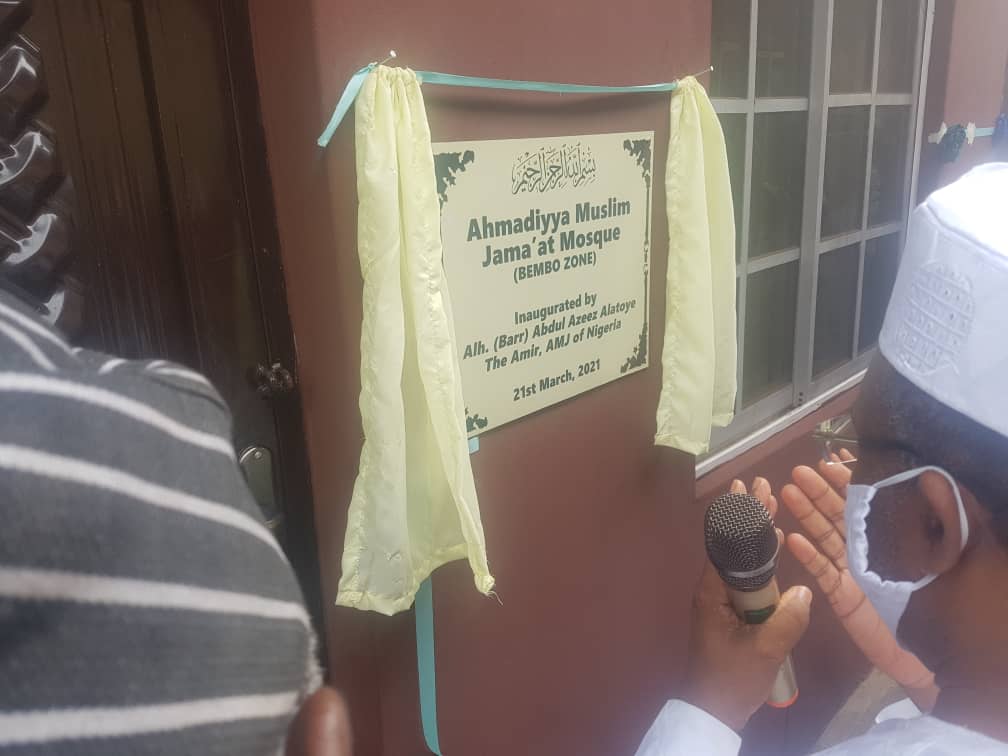
Sunday, 21st March 2021 will no doubt remained a memorable day for Ahmadiyya Muslim Jama’at of Nigeria as the Amir (National Head), Alhaji (Barr.) Alatoye Folorunso Azeez commissioned a new Mosque and laid the foundation stone of another one at the Apata (Oyo State) branch of the organization. The new Mosque is located at Bembo Area of Aba-Alamu, Apata, Oyo State. The land was donated by Pa Rauf Adekola and the foundation stone was laid on the 19th October 2019 by the then Central Missionary for the region, Maulvi Sadiq Raheem, and Branch President, Alhaji Teslim Oniyide. A total of 109 donors contributed to the construction. The Mosque can conveniently accommodate 75 worshippers at a go. Speaking at the commissioning event, the National Head appreciated the efforts of the donor and contributors towards the quick completion of the Mosque project after the former Mosque was demolished due to road expansion at Bembo Area. “It is a good sign for us all. Let us all strive to contribute financially and spiritually in the way of Allah like the donor who ensured that we establish a place of worship after the former one was affected by road expansion. “Let’s strive to always please God and improve the condition and sizes of our Mosques in order to accommodate more worshippers as much as possible especially during Jumu’ah service,” the Amir said. Foundation Stone Laying of Apata Central Mosque The Amir later proceeded to lay the foundation stone of the new Ultra-Modern Central Mosque at Apata and blessed the project with prayers. The Mosque project, which is being single-handedly sponsored by a family, is a story-building with the ground floor set aside for Car Park. When completed, it will conveniently accommodate hundreds of worshippers at the same time. Barr. Alatoye reiterated the need for all members to reform themselves internally and eschew personal grudges and differences in order to win more converts into Ahmadiyya Muslim Community. “We should always think big on how to expand our Mosques across the country. Also, there is a need to put into practice what we preach to outsiders. Let’s move on from personal grudges and fighting. We will progress and convert many people when we embrace peaceful coexistence.” “Let us always pray for the elevation of all members. It will be a good omen when this happens. Let us look for money in a legit way and contribute meaningfully to the progress of the organization. Let’s imbibe humility and do away with arrogance”, the Amir reiterated.
MINARET UNIVERSITY FOUNDATION STONE FINALLY LAID
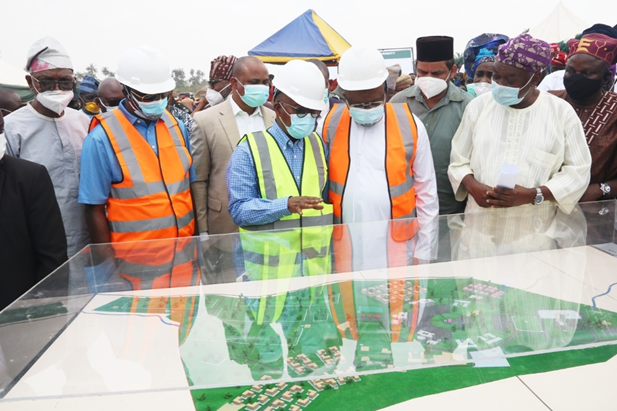
With the gracious approval and blessings of its Supreme Head, Hadhrat Khalifatul Masih V, the Ahmadiyya Muslim Community has eventually laid the foundation stone of the Minaret International University, Ikirun, Osun State. The much-anticipated foundation stone laying was performed by the Executive Governor of Osun State, Alhaji Adegboyega Isiaka Oyetola, witnessed by top dignitaries including government officials, traditional rulers, and personalities across the country. Recall that the organization had embarked on the University Project in 2017 with the processing of Certificate of Occupancy (C of O) and documentation with the National Universities Commission. The Ahmadiyya Muslim Community known to be a pioneer of Muslim education in Nigeria intends to establish a world-class tertiary institution for the intellectual and manpower development of human resources for sustainable socio-economic development nationally, regionally, and internationally. The University will also focus on environmentally sustainable growth and development of all aspects of agriculture, energy and transportation infrastructure, water and natural resources manufacturing and processing, management sciences, engineering, communication technology, humanities as well as scientific and technological research relevant to global development problems and challenges. Governor Oyetola lauded Ahmadiyya Community for its roles in educational development as well as humanitarian services within the country and across the globe. He believed education and religion are timeless and potent instruments for the development and transformation of society. “The expediency of these two tools is even more compelling today that the society requires moral and ethical rebirth. It is therefore heartening that Minaret International University is combining religion and education to build the character of our youths and help them to acquire knowledge to deliver the future that we desire. “Our Administration considers education and good moral standing as essential tools for building leaders of tomorrow and ensuring sustainable development. In line with the belief of the State that government cannot solely provide the education the State needs, successive governments have encouraged willing individuals and groups to establish schools at all levels. Consequently, Osun is home to top-notch tertiary institutions that are making their contributions to the development of the State and the nation. “The establishment of Minaret International University is a welcome addition to this family. As a notable knowledge-seeking and religion-savvy institution known for its tradition of excellence, I have no doubt that Ahmadiyya Muslim Jama’at will build a University that is a Centre of excellence in deed and in truth. I am also persuaded that the organization will produce graduates who will be problem solvers and job creators. “Ahmadiyya Muslim Jama’at of Nigeria has proved over the years to be a frontline Muslim organization in the propagation of the Islamic faith. It has also demonstrated an irredeemable commitment to the peace, progress, and welfare of the people and State of Osun and the nation. These contributions are traceable to the visionary leadership of the organization. “On behalf of the Government and people of Osun, I appreciate the leadership of this notable organization for its services to humanity and the decision to site this University in Osun, which will further expand access to tertiary education and also contribute to the development of our State,” the governor added. The Amir (National Head) of the organization in Nigeria, Barr. Alatoye Folorunso Azeez, in his address, heartily appreciated the good support and neighborliness of the State government and the host Community towards the success of the foundation stone laying event. “We are most grateful to the host Community of Ikirun, the immediate past Akirun of Ikirunland, His Royal Majesty, Late Oba Abdul Rauf Olawale Adedeji II, and the Osun State Government for the strong support to the actualization of this dream. Most importantly, we are very grateful to His Holiness, the worldwide Head of Ahmadiyya Muslim Jama’at for his kind approval of the University to be sited at Ikirun in Osun State. “MIU is owned by 215 Countries where Ahmadiyya Muslim Community has been formally established. It is the first of its kind globally, innovative University with a difference designed to promote academic excellence, moral discipline, and the spirit of selfless service for the advancement of socio-economic development, the emancipation of the people, and commitment to global cooperation for development and unity of humanity. “The philosophy of MIU is to guard against alcoholism and drug addiction, ensure banishment of cultism, embrace theory and practical/work approach, practical entrepreneurship training, embrace sports, physical fitness and martial arts and strict enforcement of moral discipline. The tuition fees will be moderate and affordable for brilliant students,” Barr. Alatoye stated.
Majlis Khuddamul Ahmadiyya Nigeria have Honour of Virtual Meeting with World Head of Ahmadiyya Muslim Community
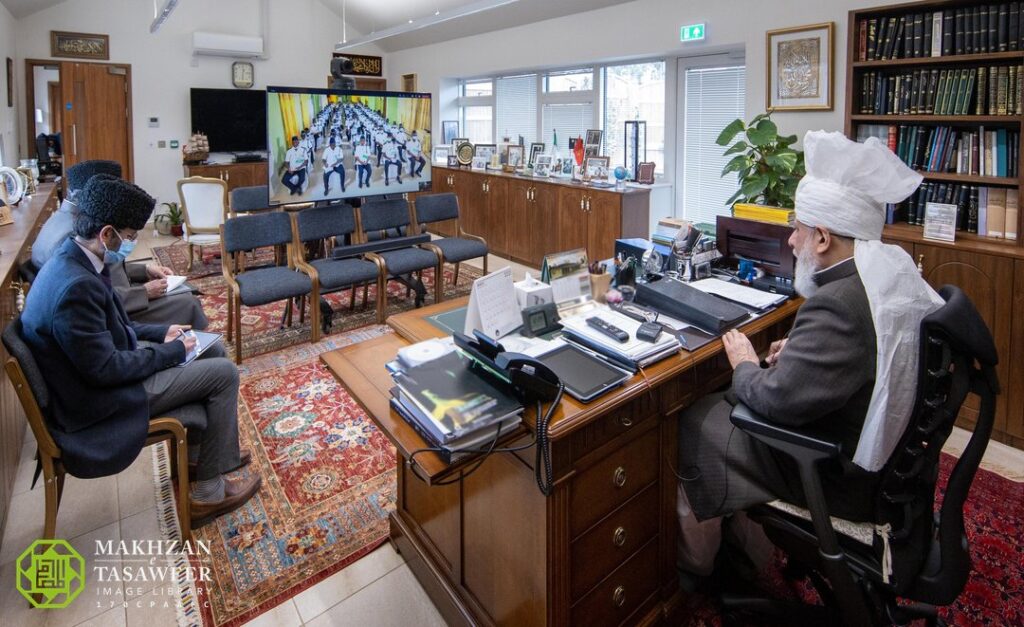
The National Amila of Majlis Khuddamul Ahmadiyya have an official meeting with His Holiness On 7 March 2021, the World Head of the Ahmadiyya Muslim Community, the Fifth Khalifa (Caliph), His Holiness Hazrat Mirza Masroor Ahmad held a virtual online meeting with the National Amila (Executive) of Majlis Khuddamul Ahmadiyya Nigeria (Ahmadiyya Muslim Youth Auxiliary), as well as regional Qaideen. His Holiness presided the meeting from his office in Islamabad, Tilford, whilst the Amila members joined the meeting virtually from the Lajna Hall in Ojokoro in Lagos, Nigeria. During the 40-minute meeting, all present had the opportunity to speak to His Holiness and the National Amila members were able to present a report about their respective departments and to receive the guidance and instructions of His Holiness on a range of issues. As the meeting concluded, His Holiness emphasised the importance of devising comprehensive plans to assist with the moral and spiritual enhancement of the members of Majlis Khuddamul Ahmadiyya. Hazrat Mirza Masroor Ahmad said: “All your Mohtamimeen (National Secretaries) should study the constitution of Majlis Khuddamul Ahmadiyya and see exactly what their duties are. Thereafter, you should make your plans according to the constitution. In your next Amila meeting you must analyse what are the shortcomings of your work and where you must strive to improve. So make a countrywide plan and then work hard to achieve your targets.”
Lajna Imaillah Nigeria have Honour of Virtual Meeting with World Head of Ahmadiyya Muslim Community
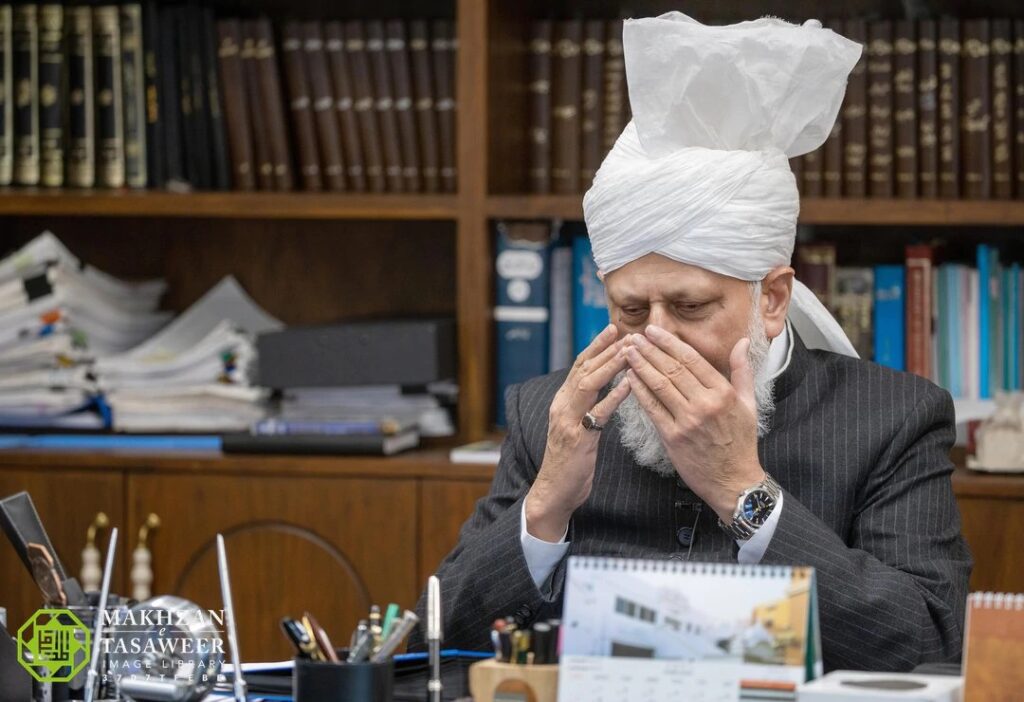
Encourage every girl to get higher education” – Hazrat Mirza Masroor Ahmad On 21 February 2021, the World Head of the Ahmadiyya Muslim Community, the Fifth Khalifa (Caliph), His Holiness Hazrat Mirza Masroor Ahmad held a virtual online meeting with members of the National Amila (Executive) of Lajna Imaillah Nigeria (Ahmadiyya Muslim Women’s Auxiliary). His Holiness presided the meeting from his office in Islamabad, Tilford, whilst the Amila members joined the meeting virtually from the Lajna Hall in Ojokoro in Lagos, Nigeria. During the meeting, His Holiness outlined the various responsibilities assigned to the respective Lajna Amila members and gave guidance on improving the activities of their departments. Speaking to the Secretary Nasirat, responsible for the moral and spiritual training of girls up to the age of fifteen, His Holiness said that their department should keep a good record of how many girls are engaging and taking part in the initiatives that were being run by the national department. His Holiness also encouraged exercise and instructed the Secretary Sehat-e-Jismani, responsible for Health and Fitness, to ensure that the Amila members should lead by example and exercise regularly. During the meeting, the Secretary Sanat-o-Tijarat, responsible for Trade and Industry, showed some of the products that the Lajna Imaillah members from across the country had made, such as bags and other items. The secretary highlighted that the Lajna Imaillah members are being assisted in making a living and are being supported in starting their own businesses. They had also assisted local society during the Covid-19 pandemic. Later in the meeting, reiterating the importance of gaining higher education, Hazrat Mirza Masroor Ahmad said: “Encourage every girl to get higher education.” As the meeting concluded, His Holiness outlined his expectations of Lajna Imaillah. Hazrat Mirza Masroor Ahmad said: “You have a huge task in front of you and I hope Lajna can achieve it and if you do, it will also encourage the men to be more active. You have to push them! My expectations with Lajna are more than the men. So I hope you fulfil my expectations. May Allah the Almighty bless you in every respect. Allah bless you all.”
National Majlis-e-Amila in Nigeria have Honour of Virtual Meeting with World Head of Ahmadiyya Muslim Community
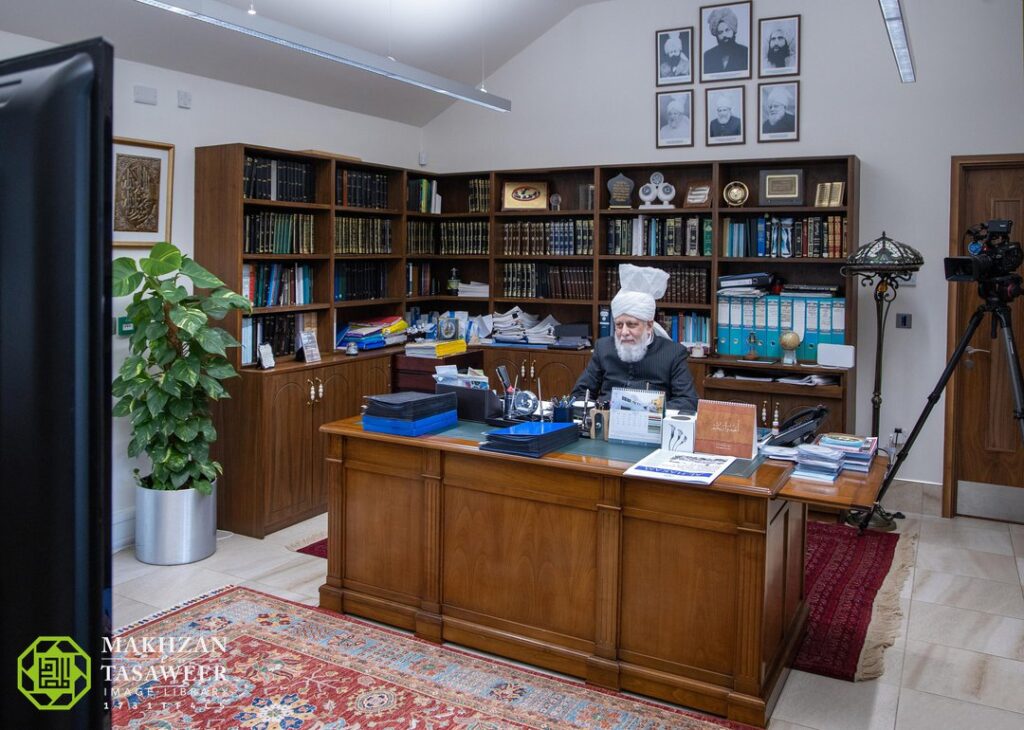
His Holiness gives guidance on a wide array of administrative and religious matters On 20 February 2021, the National Majlis-e-Amila (Executive) of the Ahmadiyya Muslim Community Nigeria were granted a virtual official meeting and audience with the World Head of the Ahmadiyya Muslim Community, the Fifth Khalifa (Caliph), His Holiness Hazrat Mirza Masroor Ahmad for the very first time. Also present were the principals of Ahmadiyya Muslim Schools in Nigeria, doctors serving in the Ahmadiyya Muslim Hospitals in Nigeria and Missionaries serving in the country. His Holiness presided the meeting from his office in Islamabad, Tilford, whilst the Amila members joined the meeting virtually from the Lajna Hall in Ojokoro in Lagos, Nigeria. During the almost 60-minute meeting, all present had the opportunity to speak to His Holiness and to receive the guidance and instructions of His Holiness on a range of issues. Speaking to the National Talim Secretary, responsible for the Education of the members of the Ahmadiyya Muslim Community in Nigeria, His Holiness said that the department should guide Ahmadi Muslim students throughout their education. Hazrat Mirza Masroor Ahmad said: “You should form a counselling and guidance committee. The purpose of the committee will be to guide and counsel the students who are secondary school-going students and guide them what further education they can pursue according to the local conditions and the local requirement.” His Holiness also advised the National Tarbiyyat Secretary, the secretary responsible for the moral training of Ahmadi Muslims, to ensure Ahmadi Muslims living in Nigeria were observant of all Islamic teachings. Hazrat Mirza Masroor Ahmad said: “Each and every Ahmadi Muslim should be very particular and punctual in offering five times daily prayers, should be very particular in reciting the Holy Quran, should be very punctual and regular and particular in reading some books of Hadith and of the Promised Messiah (peace be upon him). You should prescribe some book also for the members of the Ahmadiyya Muslim Community that they can read – those books which have been translated into English – so they can read and know what the purpose of the advent of the Promised Messiah (peace be upon him) is; what did he say, what does he want from us and how an Ahmadi Muslim should behave.” Hazrat Mirza Masroor Ahmad further stated: “If the Tarbiyyat department is active and you have done your job appropriately and in the best manner, then quite a number of other departments will run smoothly.” His Holiness also instructed that in each and every chapter of the Ahmadiyya Muslim Community in Nigeria there should be a local missionary and so, His Holiness said, a detailed plan should be made in this regard to outline how to train missionaries to fulfil this target. Furthermore, His Holiness said that every Amila member should commit their time for a two-week Waqf-e-Arzi period whereby the Amila members dedicate their time for helping teach the Holy Quran to the members of the Ahmadiyya Muslim Community or to convey the message of Islam to the wider public. As the meeting concluded, Hazrat Mirza Masroor Ahmad prayed for the attendees and said: “As I have already guided some of the secretaries, they should work hard according to my instructions and identify where you are lagging behind and see how you can improve. May Allah the Almighty bless you all.”
100 Years Ago… – News highlighting the progress of Ahmadiyyat

Al Fazl, 3-7 June 1919 Hazrat Master Abdur Rahim Nayyarra The peaceful teachings of the Ahmadiyya Jamaat and the practical display of sincerity and loyalty by Ahmadis towards Britain is generating feelings of love in the hearts of several officials. This phenomenon is not confined to India but in fact, it can be observed outside of India as well. Hence, a friend states [from the UK] that a person who had been living with an Ahmadi from a long time went to a British officer in order to find work. When the officer began to interview the applicant and asked about his place of residence, he replied that he lived with an Ahmadi. Thereupon the following discussion took place: Officer: Are you an Ahmadi as well? Applicant: [Afraid that the officer might be offended by the name of an Ahmadi] No sir! Officer: It is strange that you have been living with an Ahmadi for such a long time, but you have not accepted the truth. Go and become an Ahmadi first and come back (on a certain date). We are grateful to Allah the Almighty that several officials have reverance for the honesty, sincerity and loyal sentiments of Ahmadis. A pious judge News has come in from a foreign country that opponents have filed a false case against Ahmadis. Before appearing in court, the Ahmadi lawyer handed over several books of the Ahmadiyya Jamaat to the judge in order to inform him about its beliefs. The honorable judge read these books and said: “Before reading these books, I used to believe that the Holy Prophet[sa] was (God forbid) a dishonest and deceitful person. However, after going through these books, my point of view changed, so much so that my wife and I began to constantly repent and in fact, we became quite perturbed for our wellbeing.” May Allah the Almighty enable him to become an Ahmadi Muslim. An officer’s life saved The young man who saved the life of Lieutenant […] at Hafizabad railway station was Bashir Hayat Ahmadi, son of sub-inspector, Muhammad Hayat Sahib Ahmadi. We are proud at the loyal act of this Ahmadi gentleman. The promulgation of Ahmadiyyat in Rohilkhand Hafiz Syed Mukhtar Ahmad Sahib Mukhtar Shahjahanpuri writes: “During the past three years, Ahmadiyyat has progressed and continues to advance parallel to the increase in intensity and vehement opposition in several districts. Since the initiation of opponents’ gatherings, 40 individuals have accepted Ahmadiyyat in Pilibhit Bareilly and Shahjahanpur. The increase in numbers of the Ahmadiyya Jamaat during the past three years has never been witnessed before, even in decades long periods. “It becomes evident from the current climate that as the rising opposition causes difficulty and brings about the loss of wealth and life for Ahmadis, by the grace of Allah the Almighty, it also serves as a remarkable means for the progress, promulgation and introduction of Ahmadiyyat. “The present condition is such that in the last week of April, 15 individuals of Bareilly accepted Ahmadiyyat. Today, two young men of Shahjahanpur sent their requests of Bai‘at. Their acceptance of Ahmadiyyat will be a source of blessings for the Ahmadis of Shahjahanpur, Insha-Allah. Among these gentlemen is Syed Qutbuddin Sahib, son of Maulvi Syed Muinuddin Sahib who translated the book Napoleon Azam. It is quite fascinating that in the same week, when the wording of Maulvi Muinuddin Sahib’s translated book was presented in the article discussing an earthquake as a proof for the meaning of war to also be taken from the word ‘earthquake’, Syed Qutbuddin Sahib entered the pale of Ahmadiyyat.” Syed Qutbuddin Sahib’s request of Bai‘at “Syedi [my master] and Maulai [my leader]; Assalamo Alaikum wa Rahmatullahi wa Barakatuhu!During the past three months, I became well informed by reading the fine works of Jariyullah fi Hulalil Anbiya [the champion of Allah in the mantle of all the prophets], the Promised Messiah and Imam Mahdias and several books of beloved Huzoor [Hazrat Khalifatul Masih IIra]. I carried out discussions about Ahmadiyyat and listened to certain discourses. I attended non-Ahmadi gatherings that were conducted here this year and read several books of theirs. Moreover, I compared some books to each other. Consequently, Allah the Almighty granted me strength to reach this conclusion that Hazrat Jariyullahas [the Promised Messiahas] was truthful and honest in all his claims. Thus, I respectfully request beloved Huzoor to bless me with the honour of Bai‘at and pray for me to remain resolute and steadfast. Your servant, Syed Qutbuddin.” Syed Shujaat Hussain Sahib’s request of Bai‘at “Syedi [my master] and Maulai [my leader]; Assalamo Alaikum wa Rahmatullahi wa Barakatuhu! I had the opportunity to examine several books of the Promised Messiahas here. Once I finished reading Kitab-ul-Bariyyah, by the grace of Allah the Almighty, the truth became completely manifest upon me and I was fully satisfied that the Promised Messiahas was truthful in all his claims. Now, I wish that beloved Huzoor [Hazrat Khalifatul Masih IIra] bless me with the honour of Bai‘at and pray that I remain resolute and steadfast. Wassalam; Your humble servant, Shujaat Hussain of Shahjahanpur, Overseer at the Court of […].”
Islam – Introduction
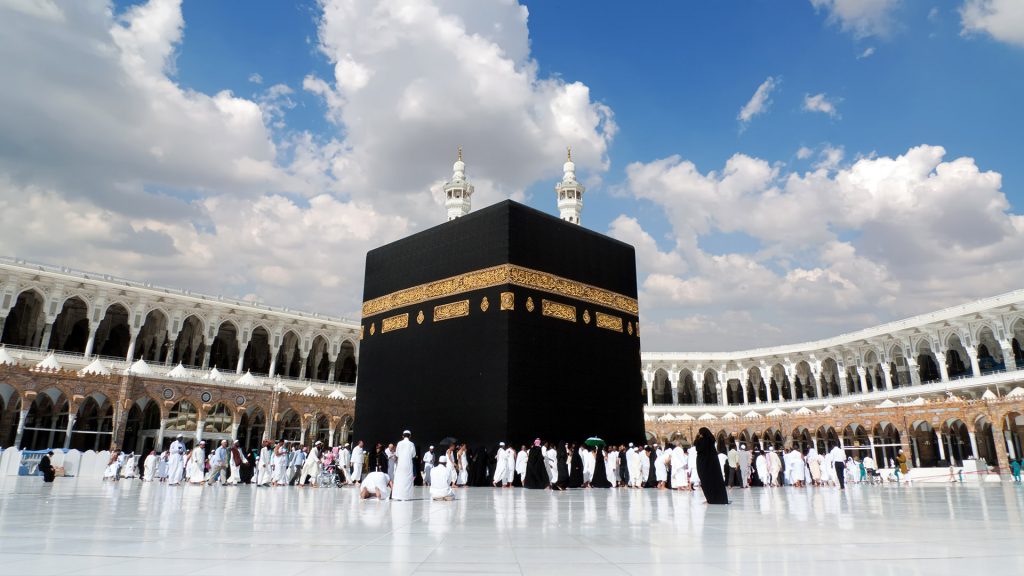
What does Islam really teach? What are its fundamental beliefs, and what are the actions it enjoins? What is the Qur’an, and what wisdom does it contain? These pages seek to answer these questions, and give the reader a perfect starting point to learn about this great faith. We start with the Articles of Faith, which are the six core beliefs of Islam. As it is a key principle in Islam that belief must be put into action, we then move onto the Pillars of Faith, which are the five key religious acts to be performed by Muslims. Thereafter we discuss the Qur’an, and offer an overview of Islamic History. Please note that the letters (sa)/pbuh or (as) appearing after the name of the Prophet Muhammadsa and other Prophets respectively, indicates an Arabic honorific translating to ‘peace be upon him.’ (ra) indicates ‘May Allah be pleased with him/her.’ Further Learning Once you’ve exhausted the pages on this website, you may want to know where else you can learn about Islam! For that reason, we’ve compiled some further sources of education below. Books An Elementary Study of Islam By Hazrat Mirza Tahir Ahmad This book, written by the blessed 4th Khalifa of the Ahmadiyya Muslim Community, provides an insightful overview of the core teachings of Islam. Much of this section is excerpted from this wonderful introduction. Read it now. Holy Qur’an with Short Commentary This publication of the Ahmadiyya Muslim Community is a perfect introduction to the text of the Qur’an itself. With an easy-to-read English translation, and commentary summarised from the 2nd Khalifa’s, the book constitutes a short but in-depth primer to Qur’anic scholarship. Read it online or by PDF. Philosophy of the Teachings of Islam By Hazrat Mirza Ghulam Ahmad This classic of Ahmadiyya literature has introduced countless souls to the world of Islam. A deep and revolutionary analysis of the Islamic teachings by the Promised Messiah himself. Enlightenment awaits! Read it now. You can find countless more books freely available on the Alislam library. Multimedia MTA International The revolutionary broadcasting channel of the Ahmadiyya Muslim Community, MTA (Muslim Television Ahmadiyya) now has several different channels with endless content on Islam 24/7. See it on YouTube, watch live on its website, or visit channel 787 on Sky TV. Alislam.org Alislam is the international homepage of the Ahmadiyya Muslim Community. It is a repository of information on Islam and the Ahmadiyya Muslim Community, featuring thousands of books, articles, and hours of media production. Visit Alislam now. Ask Islam This is a treasure-trove of information on every subject, excerpted from audio recordings of the late 4th Khalifa of the Ahmadiyya Muslim Community, Hazrat Mirza Tahir Ahmad. Just search your query, and find an answer! Visit now. The Tahir Archive This YouTube channel collects all the video material of the 4th Khalifa of the Ahmadiyya Muslim Community, Hazrat Mirza Tahir Ahmad. Here you can find full original Q&A sessions, lectures delving into the depths of Holy Qur’an teachings, and videos with translations into many of the world’s languages. A must watch for further education on Islam. Watch it online here. Articles of Faith Belief in God’s Unity The following article was written by the 4th Khalifa of the Ahmadiyya Muslim Community, Hazrat Mirza Tahir Ahmad, in his much-lauded book, An Elementary Study of Islam. *** This seems to be a rather simple and elementary concept. It should not be difficult for anybody to understand the oneness of God, and there the matter seems to rest. But in fact there is far more to this than meets the eye. When one examines the concept of Unity in depth, the entire world of religion seems to revolve around this pivotal point. This belief influences man’s life in all its aspects. It also implies the negation of all else but God. So belief in the oneness of God is not the end-all of belief, but all other beliefs spring from this fountain-head of eternal truth. This also delivers a message of liberation from all other yokes and releases man from all obligations except such as is born out of his submission to God. This article has been further elucidated from different angles, both in the Holy Qur’an and the traditions of the Holy Prophet(sa) of Islam. For instance, the declaration ‘La houl wala quat illa Billah’ (There is no all-encompassing power except Allah) opens up new windows for a deeper and wider understanding of Unity. It negates all fears other than the fear of God. The second part of the same brings to the focus of attention another very important aspect of Unity, i.e. that the power to achieve good is solely dependent on God and that He is Master of all sources of strength and energy. Hence while the first part relates to the negative aspects of power, the second part relates to the positive. In application to human actions, intentions and motivations etc., these two forces are all-encompassing. Man’s intentions and his subsequent actions are always guided and controlled either by fear or hope and there is no exception to this rule. Those who do good deeds do so out of fear and hope, and those who indulge in vices are motivated by the same. The fears of non-believers belong to the negative ungodly category, and they shape their lives in accordance with these worldly fears. Sometimes they are afraid of earning the displeasure of monarchs and authorities, sometimes they are afraid of society in general or of despots and bullies. Again, sometimes they act evilly out of a fear of poverty and loss etc. So, in a world full of vices, a large part of human actions can be explained with reference to these fears. The belief in Unity dispels these fears altogether and brings to one’s mind the importance of the fear of God, which means that one must not be afraid of the displeasure of the ungodly, but should always endeavour to avoid displeasing God and shape one’s life according to that fear alone. In the positive sense, the same applies to all human motivations and consequent
Introduction to Islam

What does Islam really teach? What are its fundamental beliefs, and what are the actions it enjoins? What is the Qur’an, and what wisdom does it contain? These pages seek to answer these questions, and give the reader a perfect starting point to learn about this great faith. We start with the Articles of Faith, which are the six core beliefs of Islam. As it is a key principle in Islam that belief must be put into action, we then move onto the Pillars of Faith, which are the five key religious acts to be performed by Muslims. Thereafter we discuss the Qur’an, and offer an overview of Islamic History. Please note that the letters (sa)/pbuh or (as) appearing after the name of the Prophet Muhammadsa and other Prophets respectively, indicates an Arabic honorific translating to ‘peace be upon him.’ (ra) indicates ‘May Allah be pleased with him/her.’ Further Learning Once you’ve exhausted the pages on this website, you may want to know where else you can learn about Islam! For that reason, we’ve compiled some further sources of education below. Books An Elementary Study of Islam By Hazrat Mirza Tahir Ahmad This book, written by the blessed 4th Khalifa of the Ahmadiyya Muslim Community, provides an insightful overview of the core teachings of Islam. Much of this section is excerpted from this wonderful introduction. Read it now. Holy Qur’an with Short Commentary This publication of the Ahmadiyya Muslim Community is a perfect introduction to the text of the Qur’an itself. With an easy-to-read English translation, and commentary summarised from the 2nd Khalifa’s, the book constitutes a short but in-depth primer to Qur’anic scholarship. Read it online or by PDF. Philosophy of the Teachings of Islam By Hazrat Mirza Ghulam Ahmad This classic of Ahmadiyya literature has introduced countless souls to the world of Islam. A deep and revolutionary analysis of the Islamic teachings by the Promised Messiah himself. Enlightenment awaits! Read it now. You can find countless more books freely available on the Alislam library. Multimedia MTA International The revolutionary broadcasting channel of the Ahmadiyya Muslim Community, MTA (Muslim Television Ahmadiyya) now has several different channels with endless content on Islam 24/7. See it on YouTube, watch live on its website, or visit channel 787 on Sky TV. Alislam.org Alislam is the international homepage of the Ahmadiyya Muslim Community. It is a repository of information on Islam and the Ahmadiyya Muslim Community, featuring thousands of books, articles, and hours of media production. Visit Alislam now. Ask Islam This is a treasure-trove of information on every subject, excerpted from audio recordings of the late 4th Khalifa of the Ahmadiyya Muslim Community, Hazrat Mirza Tahir Ahmad. Just search your query, and find an answer! Visit now. The Tahir Archive This YouTube channel collects all the video material of the 4th Khalifa of the Ahmadiyya Muslim Community, Hazrat Mirza Tahir Ahmad. Here you can find full original Q&A sessions, lectures delving into the depths of Holy Qur’an teachings, and videos with translations into many of the world’s languages. A must watch for further education on Islam. Watch it online here.
